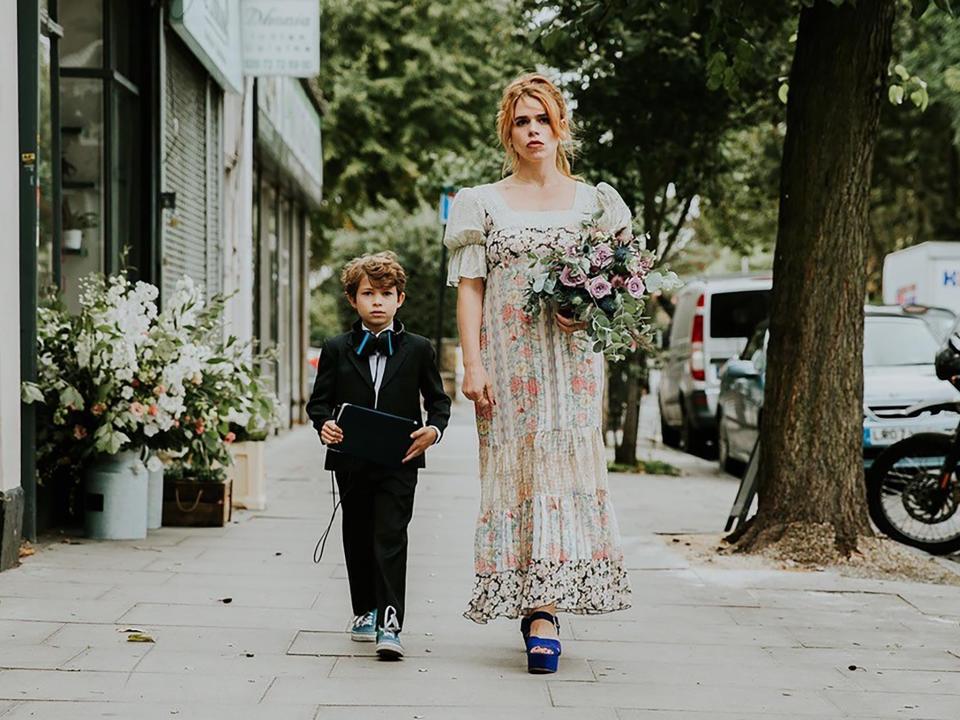Billie Piper: How the former child star became a vital voice of messiness and rage

A screwball elasticity: Billie Piper in (from left) ‘I Hate Suzie’, ‘Rare Beasts’ and ‘Secret Diary of a Call Girl’
(Sky/Republic/Shutterstock)Because Billie Piper’s debut hit “Because We Want To” came out more than two decades ago in 1998, it is easy to forget exactly how its music video starts: with Piper, then 15 and dressed in baggy purple velvet, being beamed down from a spaceship. The song, bratty and defiant and infectious, seemed designed to seduce kids and annoy parents, as if it had been composed using AI. The clip, in which the singer uses what may or may not be alien powers to melt a dustbin, seeks to sell her as not just the newest, hottest thing on earth, but the newest, hottest thing this side of Jupiter. Hordes of beautiful young people, as if being mind-controlled by Piper’s siren song, take to the streets, mounting what the lyrics call a “revolution” in defence of their inalienable right to “play that song too loud”, “hang around in crowds”, and “dance all night”.
“Because We Want To” is extremely dumb, extremely basic, and extremely hard to get out of your head once it has tunnelled its way in. If the track and the accompanying video are not particularly timeless, they are notable for underscoring two facts about Billie Piper that remain as true in 2021 as they were when she was a fresh-faced, bolshie teen: first, that she is not particularly fond of compromise, and second, that she is so far from being the identikit girl that record executives hoped for when they signed her that she might as well have come from outer space.
Rather than Jupiter or Mars, of course, she came from Swindon. Born in 1982, she was given the name Leian – meaning something close to “beautiful” or “soft” – before eventually being rechristened Billie – meaning something more like “powerful” or “determined” – six months later. The success of Piper’s recent series I Hate Suzie in the US, where it aired on HBO, has introduced overseas critics to her as a new, vital face and voice, sharp-edged and sexually frank. UK viewers cannot help but contextualise the messiness and rage that characterise her best work a little differently, familiar as they are with her ill-treatment by the tabloids.
After her brief stint as a child star, Piper married the middle-aged radio DJ Chris Evans at 18, a relationship that played out across bars and boozy parties until she turned 21, and they divorced. That most of the British public also spent their teenage years half-blitzed in pubs did not dissuade them from labelling her a train-wreck, nor did it dissuade the papers from describing her as “washed up” before she’d turned 22.
A stint as Rose on Doctor Who a few years later helped to quash her reputation as a hellion, even if it was not necessarily a dazzling showcase for her acting. Roles in Mansfield Park and a modernised take on Much Ado About Nothing did a little more to silence her detractors, and in 2016 she became the first to win Best Actress at all six major British theatrical awards for the same part: the titular one in Yerma, the Federico García Lorca play about a young wife driven mad by her desire to live up to all the expectations of successful womanhood. It was no longer possible to dismiss her as a former pop star or a professional caner or a girl who married too young, unless you happened to be very sexist, very stupid, or completely out of touch.
Like Michaela Coel – another remarkable talent with an equal flair for naturalistic drama and pure slapstick – she has been blessed with a face that blends extreme and obvious beauty with a screwball elasticity, a smile whose width and wattage is preposterous enough that seeing it onscreen in close-up can occasionally feel like staring into an eclipse. What The New Yorker’s Emily Nussbaum once characterised as Piper’s “smashed-doll features”, perfectly imperfect in their scale and malleability, lend themselves to the portrayal of a very particular kind of woman – one who physically embodies an ideal, but is too complex to idealise.

Her collaborations with the playwright Lucy Prebble, a close friend, have to date been her most interesting television projects. As Belle in 2007-2011’s Secret Diary of a Call Girl, she’s a lads’-mag-era babe viewed through the looking glass, blonde and sexy but still scatterbrained enough to make the fact she’s named after Catherine Deneuve’s cool, frigid character in Belle de Jour into a punchline. Her narration, delivered straight to the camera, is intimate in the manner of a conversation in a nightclub bathroom rather than one in the bedroom, as if you are the new best friend she’s just met after three drinks. Underneath the show’s requisite soft-core, mainstream sheen – Vaseline-smeared lenses, stockings and suspenders, a boomerish fascination with straight girls going gay for pay – lies a fascinating portrait of a sex worker whose issues have far more to do with her civilian relationships than with her job. For all its titillating sex scenes, Secret Diary of a Call Girl is at least a little radical for its suggestion that Belle’s work is, in fact, work.
Ten years later, Susie Pickles, the child star turned sci-fi actor whose sexts end up getting hacked in 2020’s I Hate Suzie, could be Belle in her mid-thirties if you squinted: tough, pragmatic, mouthy, bad with men, and exposed enough that although she is not technically breaking the fourth wall, she might as well be. Dry as muscadet, Suzie is working class made good in lieu of being a working girl, as neurotic and self-lacerating as she is self-made. In both series, Piper makes being a woman – perhaps rightly – appear far more hazardous than she made travelling through space and time look playing Rose on Doctor Who.
Now, she has written and directed what she dubs an “anti-rom-com” – the ambitious, startlingly cruel Rare Beasts, which is released on Friday (21 May). The story of a complicated, clever woman with a penchant for cocaine and a mysterious attraction to misogynistic men, the film is evidently heavily inspired by Paul Thomas Anderson’s transcendent 2002 comedy-drama Punch Drunk Love – its brand of romance, if “romance” is the right word, is cock-eyed.
In the first scene, Piper’s sort-of-heroine Mandy sits opposite Leo Bill’s repugnant Pete, a bespectacled weasel who believes in God but not in women’s rights. It is a terrible first date, and Pete and Mandy are discussing their neuroses in such frank and ugly language that we wonder at first whether we are hearing their internal monologues. Atavistically, as if each of them is sizing up a rival or a predator, they compare teeth. “[Mine] are just big, it’s deceiving,” Mandy tells him. “I actually have the correct number of teeth in my head. Thirty-two. What have you got in there, a little bag of shrapnel?” When Pete spits and hisses his way through a particularly brainless rant about the fact that women want too much in bed, Mandy slides her tongue up momentarily to her incisors, maybe thinking about tearing out his throat. “Those are classic rapist remarks,” she observes, her voice tremulous in a way that makes it hard to tell whether she’s frightened or she’s stifling a laugh. “Shall I get the bill, or does that guarantee a raping?”
Rare Beasts is not an entirely successful enterprise, partly because rather than being as forgettable as most directorial and screenwriting debuts by famous people, it has sharp teeth that bite off far more than they can chew. The dialogue is mannered to the point of sometimes feeling as if it has been adapted from a play; there are two dance sequences, both of them unnecessary. It is thrilling, though, in its sheer strangeness, its unabashed, unrepentant nastiness – there is a touch of evil in it, as if Todd Solondz or Lars von Trier were script consultants on a Richard Curtis movie.

Its best scenes are the ones that feel like the truest, most crystalline distillations of its writer-director-actor’s sensibility, melding sexual humiliation with an observation about the complexities of modern feminism, as when Mandy first undresses for an undeserving Pete: “I want to unveil myself to you one piece at a time, so that I can get used to you seeing me naked and so I can talk you through about what I physically hate about myself,” she tells him, itemising her various flaws and waiting for him to agree as she peels off her various layers, before finally bending over. “This is my arsehole,” she concludes. “Do you like it? I mean, me – do you like me?”
In addition to being a darkly funny burlesque about the discomfort inherent in being a self-critical woman getting naked for the first time with a stranger, it is also an effective way for Piper to remind us just how many strangers she has metaphorically exposed herself to in the last 23 years, hearing every insecurity she might have felt parroted back at her a hundredfold.
It would not be out of line, in light of her 2016 divorce from the tirelessly controversial Laurence Fox, to say that Piper might not have relied entirely on the strength of her imagination when it came to conjuring a love interest whose conservative, anti-feminist ideals make him an attractive partner for a liberal, lively and self-flagellating woman. It would, however, be tiresome and sexist to use Rare Beasts as another means to tie her very publicly to her ex-husband. Better would be to interpret it as a fictional exploration of a much larger phenomenon than any single man – the fundamental incompatibility of traditional heterosexual dynamics with contemporary, liberated womanhood.
The movie is a primal scream, the next logical stage in its creator’s ongoing desire to explore the freakiest, funniest, most neurotic parts of being a woman. Nobody should be surprised: Billie Piper, as she has been telling us since 1998, does what she wants to.
Rare Beasts is in cinemas from Friday 21 May
Read More
Red, white and Who: Was the American reboot of Doctor Who really that bad?
‘You’re put in Hollywood purgatory’: The bittersweet afterlife of sitcom stardom


